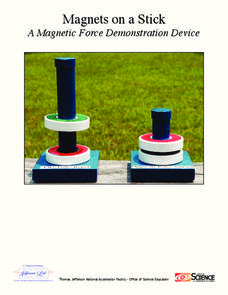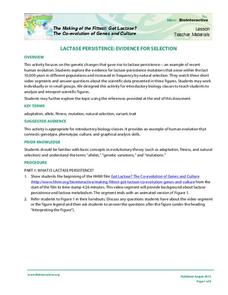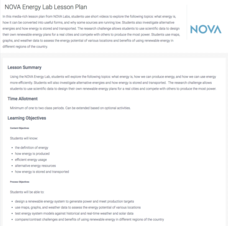California Department of Education
College: Plan Well and Pay Less
They say you gotta pay to play, and postsecondary education is no exception! High schoolers learn how to research and analyze the cost of postsecondary education as well as the different ways to pay for schooling. Learners then work...
Facing History and Ourselves
Taking a Stand: Models of Civic Participation
How does an individual take a stand for a principle or belief? what skills are required to do so? What are the challenges and risks in doing so? Class members study examples of individuals engaging in such activities and then identify...
American Bar Association
News Literacy Model Curriculum in Social Studies
Scholars investigate news literacy in the twenty-first century. They use technology, legal decisions, writings, and digital privacy to analyze the topic. Using what they learned, a group assignment looks into both the challenges and...
US Department of Energy
The Invisible Electromagnet: A Transparent Magnetic Field Viewer
Audio speakers, hard drives, credit cards, and even the earth use magnetic fields. While we observe the effect of magnetic fields, we can't actually see them. A viewer helps participants explore magnetic fields, some of the items that...
US Department of Energy
Electromagnet Experiment Stand: A Variable Power Electromagnet
Electromagnets come in both large and small scales—from big machinery in scrap yards to hard disk drives. Here's a resource that provides directions for building a variable electromagnet on a stand. Scholars then experiment with the...
US Department of Energy
Magnets on a Stick: A Magnetic Force Demonstration Device
Why do some magnets attract while others repel? Scholars use clearly labeled permanent magnets to explore the attractive question. They compare the behavior of like versus opposite poles to find the answer.
Howard Hughes Medical Institute
The Proteasome and Protein Regulation
What is a proteasome? Like tiny trash compactors inside cells, proteasomes turn worn-out proteins into reusable amino acids! Explore the topic with a presentation and embedded simulations. The resource includes a teacher's reference and...
ELT-Connect
Happy Valentine's Day
Shelves filled with heart-shaped boxes of chocolates. Bouquets of red roses. Racks of romantic cards. Stores are preparing for Valentine's Day. Has the holiday become too commercialized? That is the question asked by a lesson designed...
US Department of Energy
Go Far Cars Ramp: A Basic Ramp with Four Height Settings
Precise measurements make the job easier! One of the challenges when using an inclined plane for testing comes from pupils not using exact measurements. They often rely on books that slide or different ramp lengths when experimenting. By...
US Department of Energy
Electric Avenue: Parallel and Series Circuits
Can you infer the wiring diagram of a series of lights based on their behavior alone? Scholars work with multiple boxes of four lights. They must flip the switch and decide how the lights are wired. By applying their knowledge of...
Kenan Fellows
The Little Stuff Can Make a Big Difference
Great things come in small packages! What better way to illustrate this point than a week-long look at nanotechnology? Earth science scholars explore water quality issues through lab activities, then research new innovations in nanotech...
Kenan Fellows
Farm to Fuel: The Alternative Fuels Industry
Need a activity to fuel young minds? A variety of hands-on activities is sure to get your class fired up! Beginning with an introductory slideshow and culminating with group presentations, the week-long unit has something for everyone....
Howard Hughes Medical Institute
Visualizing Gene-Expression Patterns
How do genetics gurus know so much about gene expression? See traits materialize before your very eyes using a presentation with embedded simulations. Science scholars develop an understanding of the techniques used to follow the work of...
Howard Hughes Medical Institute
Measuring Obesity
Studies show that obesity is now a global problem. But how are researchers measuring obesity? Young scientists investigate the myriad of methods for measuring body fat through a presentation. From hands-on to high-tech, viewers learn...
Howard Hughes Medical Institute
The p53 Gene and Cancer
Is understanding the p53 gene the key to kicking cancer? Introduce a most-important protein through a presentation with colorful diagrams, simulations, and brief lectures. Viewers discover how p53 works, the cellular processes it...
Howard Hughes Medical Institute
Recent Adaptations in Humans
You've probably spent plenty of time discussing animal adaptations with your young biologists, but what about human adaptations? Explore the evolving traits of humankind through an interactive that combines text and video clips. Scholars...
Howard Hughes Medical Institute
Using the Scientific Process to Study Human Evolution
Did humans and dinosaurs coexist? How do we know? Scholars dig in to the tools and methods researchers used to study the process of human evolution by watching a slideshow with embedded video clips. Pupils learn the importance of asking...
Howard Hughes Medical Institute
Deep History of Life on Earth
Take it all the way back! Young scientists discover the changes that took place from the time Earth became solid to present day through an interesting interactive. The resource guides users through key events that have shaped our world...
Howard Hughes Medical Institute
The Eukaryotic Cell Cycle and Cancer
How does cancer begin, and why can it get so out of control? Curious young cytologists use an interactive resource to study the cell cycle. After reviewing the background information, individuals go step-by-step through the process of...
Howard Hughes Medical Institute
Lactase Persistence: Evidence for Selection
What's the link between lactase persistence and dairy farming? Biology scholars analyze data to find evidence of the connection, then relate this to human adaptation. Working individually and in small groups, learners view short video...
PBS
NOVA Energy Lab Lesson Plan
Can our energy resources keep up with our ever-growing population? Science scholars learn the basics of energy and Earth's energy resources during an electrifying lesson. The resource combines video clips and an engineering design...
Sports Museum
Boston vs Bullies: Facilitator's Guide
Score a big win for your school's environment with top-notch bullying prevention resources! The downloadable materials feature prominent sports figures from the Boston area talking about their experiences with bullying. Appropriate for...
Howard Hughes Medical Institute
WildCam Gorongosa
After years of war and unrest, how quickly will nature recover? Started as a project to track lion populations, WildCam Gorongosa now tracks many species. Through hidden camera evidence, scientists know species are returning to the area....
Nuffield Foundation
Measuring Rate of Water Uptake by a Plant Shoot Using a Potometer
How quickly does a plant transpire? Learners explore this question through measuring water uptake with a potometer. They time the movement of a bubble a set distance to understand the motion and rate of speed.

























